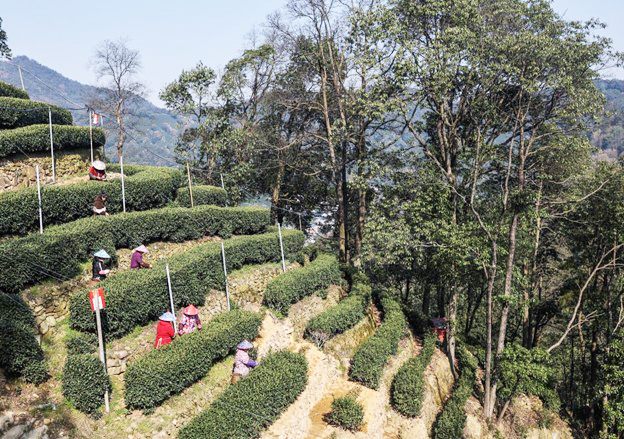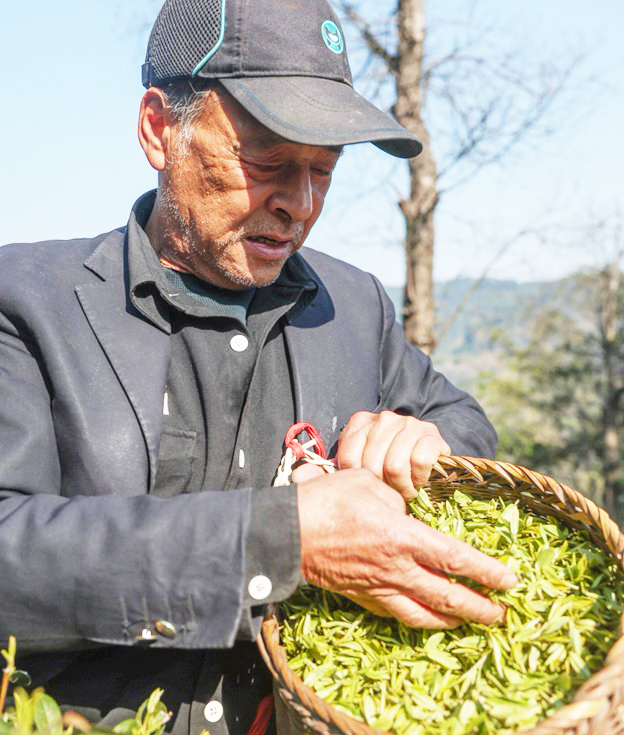Bless your Tea picking hearts
That was then this is now- This year’s Longjing tea harvest features a new addition to its workforce: tea-picking robots. Cooler-than-average weather in east China has slightly delayed this year’s Longjing tea harvest. But tea connoisseurs can still look forward to reveling in the aroma of spring tea without much delay, thanks to an innovative addition to the traditional tea-picking workforce – robots. In late 2022, China’s traditional tea-making was added to the Unesco intangible cultural heritage list. Longjing tea – named after the village of Longjing near West Lake in Hangzhou in the eastern Zhejiang province – is renowned for its lustrous green color, enticing fragrance, mellow taste and beautiful shape.
Traditionally, the picking of high-quality tea leaves in China has been very dependent on manual work. Skilled pickers can identify and pluck the most delicate leaves – containing rich nutritional components and aroma – without bruising or damaging the pieces. Another major reason for a heavy reliance on human labor is that many tea farms are on hilly sides, where mechanized equipment has proven to be impractical. However, the average age of tea pickers in Longjing’s premium production area is now 65. This growing labor shortage is increasingly challenging the viability of reliance on traditional manual picking. Tea buds and leaves do not ripen at the same time, even on the same branch. In early spring, the leaves are typically about 1 inch long, with petioles (the leaf to a stems) just about 1/8” long. “New growth looks very similar to older leaves, making it difficult to distinguish between immature and ready-to-pick tea leaves.” This year, robots have joined the ranks of tea pickers to tackle the challenge. Similar to skilled human pickers who rely on experience, these mechanical assistants use artificial intelligence (AI) to automatically identify tea buds and leaves through vast amounts of image data. The latest version of these machines can handle the workload of one and a half human workers. “Our robotic arms mimic the gentle and precise techniques of human pickers – minimizing damage to the tea leaves and the field.
Government support has reduced the cost of robot picking arms and cut the weight of the robotic arms from 200 pounds to about 50. In a Longjing tea field in Hangzhou, a comprehensive intelligent monitoring station can predict pest trends and monitor meteorological and soil data in real-time. This ensures optimal tea plant growth while addressing environmental concerns through rational irrigation and scientific fertilization. Agri Technology Co Ltd is using drones to create terrain databases for Longjing tea fields and visually track pesticide spraying, enabling eco-friendly pest control. They are also using drones to carry fertilizer up the mountain sides. He noted that drones can move over 6,000 pounds of fertilizer in a single day, saving time and effort while boosting efficiency. “Once we finish transporting fertilizer for our own village, we even help out in neighboring tea villages.” Fueled by surging demand, the application of AI in agriculture has expanded rapidly in China, highlighting the government’s continued efforts to modernize its agricultural sector to accelerate rural revitalization. This automation effort will affect the lives of more than 460 million people in rural areas (out of 1400 million Chinese people total).
Tea-ser jokes
Who had the tea party during the Boston tea party?
The fish.
Why do Communists only drink herbal tea?
Because proper-tea is theft!
Never accept tea offered by the Russian President
You don´t know what Vladimir Putin.
Every once in a while, I have a cup of tea while I’m reading.
It’s a novel- tea.
July 16th Birthdays
1985 – Katrina Caif, 1992 – Alexandra Shipp, 1979 – Jayma Mays, 1964 – Phoebe Cates
1969 – Barry Sanders, 1943 – Jimmy Johnson, 1967 – Will Farrell, 1991 – Randall Bentley




